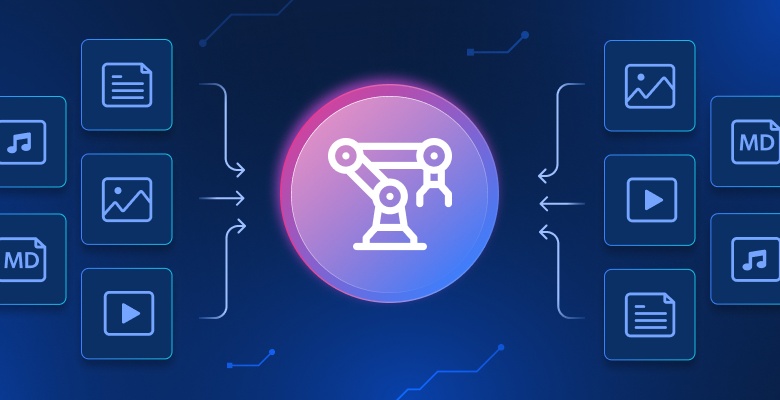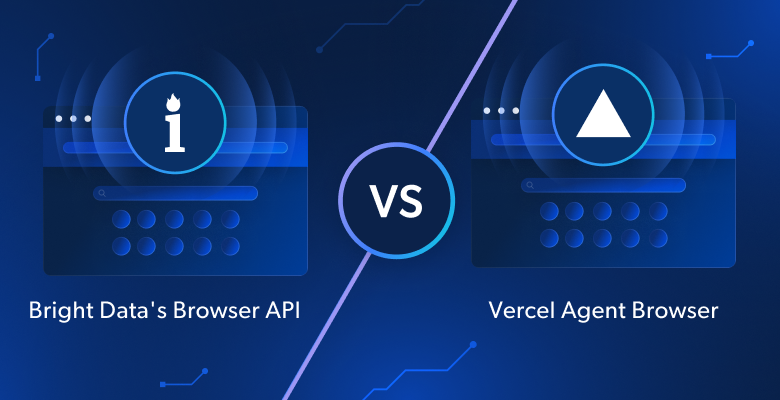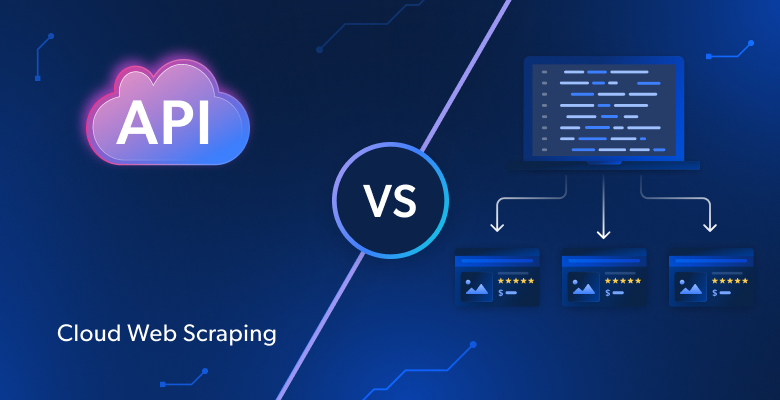In this comparison guide, you will see:
- What a PHP web scraping library is
- Key factors to consider when selecting the best PHP scraping libraries
- An overview of the top PHP scraping libraries
- A summary table highlighting the main features of the selected tools
Let’s dive in!
What Is a PHP Web Scraping Library?
A PHP web scraping library is a tool to extract data from web pages. In particular, it helps with one or more steps of web scraping in PHP.
These libraries provide features for connecting to web servers, parsing the DOM, and extracting data from web pages. Specifically, they can send HTTP requests, parse HTML content, and, in some cases, render and execute JavaScript.
PHP scraping libraries typically fall into three four categories:
- HTTP clients: To send HTTP requests and handle responses from the servers.
- HTML parsers: To parse and extract data from HTML content.
- Browser automation tools: To mimic user interactions with web browsers and deal with JavaScript execution.
- All-in-one frameworks: Tools that combine the capabilities of the categories above.
The combination of the first two is perfect for extracting data from static pages, while browser automation is required for scraping dynamic websites.
Aspects to Analyze When Selecting Scraping Libraries in PHP
Below are the key factors to consider when selecting the best PHP libraries for web scraping:
- Type: Whether the library functions as an HTTP client, HTML parser, browser automation tool, or an all-in-one web scraping framework.
- Features: The main capabilities the library provides for web scraping tasks.
- GitHub Stars: The number of stars on GitHub, which signals community interest and engagement.
- Monthly installs: The number of installations in the past 30 days according to Packagist—reflecting current usage and popularity.
- Update frequency: How regularly the library is maintained or receives new releases.
- Pros: Key benefits and strengths of using the library.
- Cons: Limitations and downsides to keep in mind.
Best PHP Scraping Libraries: Complete Comparison
Discover the top open-source PHP libraries for web scraping—handpicked and ranked based on the criteria outlined above.
For the full list of tools, explore our GitHub repository of PHP scraping libraries.
Note: This list includes only actively maintained PHP web scraping libraries. Projects that have not seen updates in several years have been excluded.
1. Panther

Panther is a browser automation and web crawling library developed by the Symfony team. It provides a rich API for navigating and interacting with both static and dynamic web pages.
Under the hood, Panther can launch a real browser via php-webdriver. That means it comes with full JavaScript support for scraping modern, dynamic websites. Also, it has a lightweight mode that uses Symfony’s BrowserKit component for scraping static pages more efficiently.
Since Panther builds on top of popular libraries, its syntax feels intuitive to developers already familiar with other PHP scraping tools. It supports DOM querying with both CSS selectors and XPath, giving you flexibility in how you extract content.
The combination of real-browser automation and a developer-friendly API makes Panther the best library for scraping in PHP.
Composer installation command:
composer require symfony/panther🧩 Type: All-in-one web scraping framework
⚙️ Features:
- Rich browser automation API with support for Chrome and Firefox
- Supports both static and dynamic browsers, with the option to execute or disable JavaScript on the page
- Can take screenshots
- Can execute JavaScript on web pages
- Full API for browser automation and data extraction
⭐ GitHub stars: ~3k+
📦 Monthly installs: ~230k
🗓️ Update frequency: Around once every several months
👍 Pros:
- Available as a Symfony component.
- Native support for Chromium-based browsers and Firefox (extra configuration required for Safari, Edge, and Opera).
- Built on top of popular PHP web scraping libraries like
php-webdriver,BrowserKit,DomCrawler, and Goutte.
👎 Cons:
- Requires manual downloads for WebDrivers
- Cannot handle XML documents
- Inherits limitations from
php-webdriverandDomCrawler
2. Guzzle

Guzzle is an effective PHP HTTP client for sending requests and integrating with web services. It provides a clean and flexible API for making HTTP calls, whether you are fetching pages, submitting forms, or streaming large payloads.
As a PSR-7-compliant client, Guzzle works with other PSR-7 libraries and promotes transport-agnostic code. That means it frees you from worrying about underlying details like cURL, PHP streams, or sockets.
You can send both synchronous and asynchronous requests using the same interface, making Guzzle ideal for efficient scraping workflows.
Guzzle’s middleware system lets you customize request behavior, add logging, inject headers, manage retries, and more. That versatility is enough to say that Guzzle is one of the top HTTP clients in PHP.
Composer installation command:
composer require guzzlehttp/guzzle🧩 Type: HTTP client
⚙️ Features:
- Simple interface for building query strings and POST requests
- Supports streaming large uploads and downloads
- Custom HTTP cookies and headers are supported
- Unified interface for both synchronous and asynchronous requests
- Uses PSR-7 compliant standardized request, response, and stream interfaces for interoperability
- Proxy integration support
- Abstracts the HTTP transport layer, enabling environment-agnostic code (no hard dependency on cURL, PHP streams, etc.)
- Middleware support to customize and extend client behavior
⭐ GitHub stars: 23.4k+
📦 Monthly installs: ~13.7M
🗓️ Update frequency: Around once every few months
👍 Pros:
- Provides a wide range of features for advanced HTTP requests
- Supports both synchronous and asynchronous request handling
- Middleware and handler support for high customization and extensibility
👎 Cons:
- Official documentation has not been updated in years
- Although there are many contributors, most of the work is done by a single developer
- Some developers report issues related to caching
3. DomCrawler

DomCrawler is a PHP component from the Symfony ecosystem for navigating and extracting data from HTML and XML documents. In detail, it exposes a clean and expressive API for DOM traversal and content scraping.
One of its standout features is its ability to perform browser-like DOM queries using XPath. If you prefer CSS selectors, you will need to install the optional CssSelector component.
DomCrawler is generally paired with Guzzle or Symfony’s HttpClient (or BrowserKit) for scraping static sites in PHP.
Thanks to its tight integration with Symfony components and its developer-friendly syntax, DomCrawler is one of the go-to solutions for parsing HTML in PHP.
Composer installation command:
composer require symfony/dom-crawler🧩 Type: HTML parser
⚙️ Features:
- Supports DOM navigation for both HTML and XML documents
- Automatically corrects HTML to match official specifications
- Native support for XPath expressions
- Built-in integration with the
HttpBrowserfrom the SymfonyBrowserKitcomponent - Native HTML5 parsing support
- Provides specialized
Link,Image, andFormclasses for interacting with HTML elements during traversal
⭐ GitHub stars: 4k+
📦 Monthly installs: ~5.1M
🗓️ Update frequency: Around once a month
👍 Pros:
- Available as a component of Symfony, one of the most popular PHP frameworks
- Rich node traversal API
- Special features for handling forms, links, and other key HTML elements
👎 Cons:
- Not designed for DOM manipulation or re-exporting HTML/XML
- Requires an additional component for CSS selector support
- Limited capabilities when filtering child elements of an HTML node
4. HttpClient

Symfony’s HttpClient component is a modern PHP library for sending HTTP requests and handling responses.
It supports both synchronous and asynchronous requests and comes with advanced features such as automatic decompression, content negotiation, HTTP/2 support, and built-in retry logic.
HttpClient integrates seamlessly with other Symfony components like DomCrawler for static site scraping. It is also serves as the foundation of the larger BrowserKit component, which builds on top of HttpClient to simulate the behavior of a web browser.
Composer installation command:
composer require symfony/http-client🧩 Type: HTTP client
⚙️ Features:
- Low-level HTTP client API that supports both synchronous and asynchronous operations
- Supports PHP stream wrappers
- Support for cURL
- Offers advanced configurations like DNS pre-resolution, SSL parameters, public key pinning, and more
- Supports authentication, query string parameters, custom headers, redirects, retries for failed requests, HTTP proxies, and URI templates
⭐ GitHub stars: ~2k+
📦 Monthly installs: ~6.1M+
🗓️ Update frequency: Around once a month
👍 Pros:
- Available as a Symfony component, but can also be used as a standalone library
- Interoperable with many common HTTP client abstractions in PHP
- Extensive documentation
👎 Cons:
- Lacks native support for some advanced authentication mechanisms
- Potential performance issues in certain scenarios
- Can be more complex to set up in non-PSR-7 environments
5. php-webdriver

php-webdriver is the community-driven PHP port of the Selenium WebDriver protocol. In other words, it brings Selenium’s powerful scraping capabilities to the PHP ecosystem.
It enables full browser automation, letting you launch and programmatically control real browsers—such as Chrome and Firefox. This makes it great for scraping dynamic websites or client-side rendered applications that rely heavily on JavaScript.
With php-webdriver, you can simulate real user interactions such as clicking buttons, filling out forms, waiting for dynamic content, and more. It also equips you with methods for DOM traversal and CSS selector querying.
Keep in mind that to operate php-webdriver, you need to set up a Selenium server or use tools like ChromeDriver.
For more information, refer to our tutorial on Selenium web scraping.
Composer installation command:
composer require php-webdriver/webdriver🧩 Type: Browser automation tool
⚙️ Features:
- Compatible with Chrome, Firefox, Microsoft Edge, and any browser that supports the WebDriver protocol
- Supports headless mode
- Allows customization of browser headers and cookies
- Provides a rich user simulation API to navigate to pages, interact with elements, and more
- Can take screenshots
- Dedicated API to extract data from page elements
- Supports JavaScript script execution
⭐ GitHub stars: 5.2k+
📦 Monthly installs: ~1 .6M
🗓️ Update frequency: Around once every several months
👍 Pros:
- Offers a browser automation API similar to Selenium
- Supports Selenium server versions 2.x, 3.x, and 4.x
- Simple integration with Panther, Laravel Dusk, Steward, Codeception, and PHPUnit
👎 Cons:
- Not officially maintained by the Selenium team
- As an unofficial port, it often lags behind official Selenium releases
- Requires running a local WebDriver server
6. cURL

cURL is a low-level HTTP client integrated into PHP. It allows you to interact with web servers, providing complete control over HTTP requests.
While it supports several web protocols, it is primarily used for sending HTTP requests. That is the reason why it is commonly referred to as an HTTP client.
Behind the scenes, cURL handles redirects, manages headers, and works with cookies. So, it can fetch the HTML content of a page or interact with APIs. That makes it powerful enough for basic web scraping tasks in plain PHP, without additional dependencies.
Note that cURL may not be enabled by default in some PHP installations. If it is not enabled, you may need to activate it in your PHP configuration (php.ini) or install it manually using the following command:
sudo apt-get install php-curl🧩 Type: HTTP client
⚙️ Features:
- Supports a wide range of protocols, including HTTP, HTTPS, FTP, FTPS, SMTP, and more
- Supports HTTP/2.0
- Supports HTTP methods such as GET, POST, PUT, DELETE, and PATCH
- Allows customization of headers and cookies
- Supports file uploads and downloads
- Integrates easily with proxies
- Supports multipart requests for complex form submissions
- Provides a verbose mode for easier debugging
- Allows capturing and manipulating response data, such as JSON, XML, or HTML
⭐ GitHub stars: —
📦 Monthly installs: —
🗓️ Update frequency: —
👍 Pros:
- Built-in to PHP, so no external library is needed (though a PHP component may need to be installed at the OS level)
- Many other HTTP clients are built on it or can wrap it
- Great for web scraping due to its low-level integrations and capabilities
👎 Cons:
- Low-level API, making it difficult to master
- Challenging error handling
- No native retry capabilities for failed requests
7. Simple Html Dom Parser

voku/simple_html_dom is a modern fork of the original Simple Html DOM Parser library. That was once a popular choice for parsing HTML in PHP but has not been maintained in years.
Compared to the original version, this fork has been updated to use more modern technologies. Thus, instead of relying on string manipulation, it now utilizes the DOMDocument PHP class and components like Symfony’s CssSelector.
Like the original, this updated version of Simple Hhtml DOM Parser provides a simple and intuitive API for DOM traversal. For example, it exposes functions like find() to search for elements using CSS selectors.
Its syntax is easy to read and write, making it suitable for both static and dynamic HTML pages. Note that, as a basic HTML parser, it cannot handle web pages that require JavaScript execution.
Composer installation command:
composer require voku/simple_html_dom🧩 Type: HTML parser
⚙️ Features:
- Intuitive API for HTML parsing and manipulation
- Compatible with PHP 7.0+ and PHP 8.0
- Built-in UTF-8 support
- jQuery-like selectors for finding and extracting HTML elements
- Can handle partially invalid HTML
- Returns elements as strongly typed objects
⭐ GitHub stars: 880+
📦 Monthly installs: ~145k
🗓️ Update frequency: Around once every several months
👍 Pros:
- Uses modern tools under the hood like
DOMDocumentand modern PHP classes such as Symfony’sCssSelector - Comes with examples and API documentation
- Follows the PHP-FIG standards
👎 Cons:
- Some confusion deriving from the many other forks of the same original library
- Maintained primarily by a single developer
- Development progress is relatively slow
Other Honorable Mentions
- Goutte: Previously a popular PHP screen scraping and web crawling librar. It offered an easy-to-use API to crawl websites and extract data from HTML/XML responses. As of April 1, 2023, this library is deprecated and now acts as a simple proxy to Symfony’s
HttpBrowserclass. For a tutorial, refer to our guide on using Goutte for web scraping in PHP. - Crawler: This library provides a framework and a variety of ready-to-use “steps” that serve as building blocks for creating your own crawlers and scrapers in PHP.
Top PHP Scraping Library
Here is a summary table to help you quickly compare the best PHP web scraping libraries:
| Library | Type | HTTP Requesting | HTML Parsing | JavaScript Rendering | GitHub Stars | Monthly Downloads |
|---|---|---|---|---|---|---|
| Panther | All-in-one web scraping framework | ✔️ | ✔️ | ✔️ | ~3k+ | ~230k |
| Guzzle | HTTP client | ✔️ | ❌ | ❌ | 23.4k+ | ~13.7M |
| DomCrawler | HTML parser | ❌ | ✔️ | ❌ | 4k+ | ~5.1M |
| HttpClient | HTTP client | ✔️ | ❌ | ❌ | ~2k+ | ~6.1M+ |
| php-webdriver | Browser automation tool | ✔️ | ✔️ | ✔️ | 5.2k+ | ~1.6M |
| cURL | HTTP client | ✔️ | ❌ | ❌ | — (as it is part of the PHP standard library) | — (as it is part of the PHP standard library) |
| Simple Html Dom Parser | HTML parser | ❌ | ✔️ | ❌ | 880+ | ~145k |
For similar comparisons, take a look at the following blog posts:
- Best JavaScript web scraping libraries
- Best Python web scraping libraries
- Top 7 C# web scraping libraries
Conclusion
In this article, you saw some of the top PHP web scraping libraries and what makes them unique. We compared popular HTTP clients, HTML parsers, browser automation tools, and scraping frameworks commonly used in the PHP ecosystem.
While these libraries are great for web scraping, they do have limitations when it comes to handling:
- IP bans
- CAPTCHAs
- Advanced anti-bot mechanisms
- Other anti-scraping measures
These are just a few of the challenges that PHP web scrapers encounter regularly. Overcome them all with Bright Data’s services:
- Proxy services: Several types of proxies to bypass geo-restrictions, featuring 150M+ residential IPs.
- Scraping Browser: A
php-webdriver-compatible browser with built-in unlocking capabilities. - Web Scraper APIs: Pre-configured APIs for extracting structured data from 100+ major domains.
- Web Unlocker: An all-in-one API that handles site unlocking on sites with anti-bot protections.
- SERP API: A specialized API that unlocks search engine results and extracts complete SERP data.
All the above web scraping tools integrate seamlessly with PHP—and any other programming language.
Create a Bright Data account and test our scraping products with a free trial!






